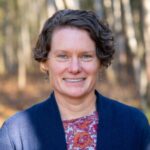
Dawn Dillard never wanted to retire. The 57-year-old expected to keep working as a public advocacy lawyer until she turned 100, but last year, a diagnosis of uterine cancer forced her into retirement. Now her full time job is fighting terminal cancer. And she says even if the disease kills her, she doesn’t want it to defeat her.
The cancer that’s killing Dawn Dillard has left her sense of humor very much intact. She greets me at the door of her Kenai home wearing a black shirt that reads, “I’m not dead yet…”
Dillard lives in a split level house in Kenai with her husband Ron, two gigantic dogs and three ferrets, Whitey, Chunk and Chum.
Dawn met Ron met doing community theater in Bethel in 1998. They married five years ago on snowmachines in spring as the last snow was melting from the tundra.
In some ways, they’re opposites. Ron is tall, with long wavy hair, a gray beard and red suspenders. Physically, he’s a big presence, but a quiet one. Dawn is much smaller, but she has a light-up-the-room personality and is always cracking jokes with a slightly devious twinkle in her eye.
The couple expected to grow old together. Then Dawn caught a basic cold in January 2012. Weeks went by. She visited a doctor several times, but never got better. Finally, she asked for a pap screening. It’s supposed to be an annual exam, but Dawn says she had skipped it for at least five years.
“I would just put it off. I’m like, ‘ah yeah, I know I need to do this, but I’m going on vacation next month, or I have a big trial coming up,’” Dawn says. “You know, it was something I just kept pushing back in the back of my mind, I knew I needed to do it, but I didn’t.”
By this time, Dawn knew something was seriously wrong. And the test confirmed it – she had uterine cancer.
She had to fly to Anchorage for more tests to find out it had metastasized to her liver and abdomen. A gynecologist recommended starting chemotherapy right away.
“And I said, well, I don’t know if I want to do chemotherapy, what other options do I have?” Dawn says. “And he said, ‘Well, if you do nothing you’ll be dead in two months.’”
Since that day, Dawn’s life has been a blur of blood draws, surgeries, procedures and doctors appointments along with chemotherapy. She’s lost track of the exact number of chemo sessions she’s had. She and Ron moved to Kenai in February, in part so she could be closer to a treatment center.
Dawn is greeted by the nurses as she walks in the door at Katmai Oncology in Soldotna. She settles into a beige recliner for two hours of chemotherapy. She jokes with a nurse about the name of the chemo drug dripping into her vein – Topotecan.
“I dream about it. Doesn’t it sound like oughtta be a Caribbean island? To-po-TEE-can,” Dawn says, drawing out the word. “Instead of a horrible medicine that makes you feel rotten.”
When she first started chemo, a doctor told Dawn she could expect to live about a year. She’s beat that prediction by at least five months. And she’s hopeful the latest round of chemotherapy will make a difference. But at this point, she’s happier not knowing her prognosis:
“Part of me does want to know but for the most part, I don’t,” Dawn says. “I mean right now I feel strong; I can walk up and down the stairs; I can go to the grocery store; I can play with my dogs and they’re enormous; And I don’t feel weak.”
Dawn says the hardest thing about living with a terminal illness is the uncertainty. She wants to go to San Francisco and maybe even Hawaii, but doesn’t know how far ahead she should book the flights. The main priority right now though is spending time with Ron. She says she can’t imagine going through cancer without him. He’s always at her side.
Ron: “We’ll take care of her, they’ll take care of her and the world keeps turning because she’s here.”
Annie: “This must be really hard on you though?”
Dawn: “Yeah, it is.”
Ron: “Something about that to have and to hold thing. So, I’ve got her.”
As for the future, Dawn hates the phrase, ‘taking it a day at a time’. She prefers to say she’s winging it and just trying to enjoy life.
This story is part of a reporting partnership between APRN, NPR and Kaiser Health News.
Annie Feidt is the broadcast managing editor at Alaska Public Media. Reach her at afeidt@alaskapublic.org. Read more about Annie here.





